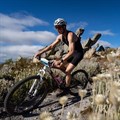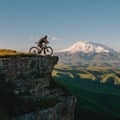The physiological makeup of a woman mountain bike rider

Hill is one of the coaches of the #SheUntamed initiative, a programme designed to improve women’s access to the sport of mountain biking through women’s increased participation in the Team Absa line-up. This is one of several initiatives created by Absa to drive transformation, diversity and inclusion and, in turn, is part of Absa’s ambition to be an active force for good in everything that they do.
Tell us about yourself
I have completed both my Bachelor's degrees in Exercise Science with a focus on Exercise Physiology and Advanced Sports Nutrition, and Psychology with a focus on Sport Psychology at Brevard College, NC, USA. I am currently studying for my Master's in Clinical Sports Psychology with the goal of eventually making it to a PhD. Additionally, I have completed SCISS, a Cycling Science Certification through Science2Sport and UCI Level 1 to help me specialise more in the coaching world.
I have been coaching on the mountain bike skills side of things for the past six years. I realised that, alongside analysing data and prescribing training, riders needed more if they want to progress as "whole" athletes. Mountain bike skills not only help people feel more comfortable on their bicycles, but it helps them feel more comfortable in their own skin. The growth in self-confidence (particularly with the women riders), was special for me to be a part of. I am a huge advocate for more women on bikes, because it unlocks a new space of self-confidence and will to accomplish what they previously thought was impossible.
What I enjoy most about my job is the collaboration of the journey. I love watching my athletes grow. That process is uncomfortable and tough, whether that be to enter their very first race, or ride 100km – to grow is to break through.
What are the physiological demands of cycling?
Physically, the demands of cycling include:
- A solid foundation that includes a large amount of endurance, which heavily relies on the aerobic system.
- The ability to produce large amounts of power for extended periods of time, whether this is massive sprints for minutes or time trials that extend to more than one hour. Especially when it comes to mountain biking, the production of power is absolutely necessary as we need to ride over rocky, steep terrain – and around tight switchback corners.
- Anaerobically, those tiny sprints that are produced around corners and between technical sections of the course are essential to maintain momentum. These micro efforts need neuromuscular training. As the athlete improves in resilience and time to exhaustion, we add intervals such as 40s max; 20s rest to stimulate lactate development, oxygen depletion, and the ability to recover quickly between anaerobic efforts.
Ultimately, cycling demands a lot from the body. Just sitting on the saddle for hours at a time is hard. To be able to pedal for eight to 10 hours a day for seven days in a row takes a huge amount from the body. Diet and hydration are imperative to peak performance. The gut digests differently under stress, and that stress can come from a hard effort, a long day, hot/cold temperatures, an injury, a bad meal… It’s incredibly sensitive.
As riders attempting to conquer the Absa Cape Epic, we need to understand how our own digestive system works and how we can effectively race our best while fuelling with the highest quality nutrition. Hydration is a make-or-break topic when it comes to stage racing. Dehydration is the most common, but the real danger is overhydration. Ensuring riders consume enough electrolytes and protein to ensure that the digestion of carbohydrates takes place, is so important. Something I personally slipped on this year at the 2022 Absa Cape Epic – toxins develop in the body due to the efforts that we are requiring out of our muscles, and to flush them out while allowing our muscles to repair takes practice!
What are some of the physiological challenges that women face when preparing for a cycling/mountain biking race?
Managing menstrual cycles with training, ensuring that this is taken into consideration while training in different phases of her cycle to prepare herself if she menstruates during the Absa Cape Epic.
Strength: Particularly for this upcoming race, our girls need to work on their upper body strength to help them manage the bumpy/rocky terrain that they can expect to see.
Time – all of our #SheUntamed riders work full-time jobs. Balancing family life while training is a huge demand on the body (as there is minimal time to rest).
Iron-level management. More commonly than not, we see a rapid decline in iron levels in female athletes, especially when it comes to endurance sports. Regular check-ins with the doctor to run through a full blood workup is necessary. You may be struggling with large amounts of fatigue – only to find that your iron levels have dropped due to the demands of training.
Nutrition. Higher carbohydrate intake during certain phases of your cycle is imperative to ensure the best performance.
What are the benefits of mountain biking, besides strengthening your body?
Outside is free, and you do not have to pay to cycle.
The psychological component of doing something that you love without the help of others is massive for women in the sport. For too long, many riders had lost their sense of independence. Riding a mountain bike empowers women to do what they never thought they could – accomplish dreams and goals such as the Absa Cape Epic.
Expanding the social group. As you grow older, friends are few and far between, and riding a bike allows more socialising and connection with other like-minded people. To feel a part of something is a great benefit.
Explore and travel the world. It starts with your local bike race, then turns into a bucket list of events you’d like to tick off in your life! I have seen the best parts of this planet thanks to a bike. Plus, you get to ride in places that cars cannot reach – what a treat!
Look good = feel good! Riding your bike stimulates the metabolism. Not only do we get to explore the outdoors, but we get to feel the endorphins run through our bodies too.

How important are handling skills while mountain biking?
This is a rapidly developing component of mountain biking. The routes are getting harder, and from a technical standpoint, we are riding over some of the most difficult courses in the world. With bicycle technology constantly evolving, we are now equipped to ride more difficult terrain faster and more comfortably. Mountain bike skills are often overlooked when it comes to preparing for big events, a narrative I’d like to change.
With the correct handling skills, riders can look to take off up to five hours of riding time over an eight-day event!
When training for the Absa Cape Epic, should one only ride a bike?
Time on the bike is important, especially when preparing for a week-long event. But with an event like the Absa Cape Epic (trust me), riding isn’t the only thing that is going to get you through! We can expect a portage section, one that requires a mandatory dismount and walking next to your bike for at least one kilometre downhill. Ankle stability is so important here. This can be trained the best by incorporating trail runs into your training programme.
Recovery hikes are also a great way to mix up the long hours on the bike, as even the pros walk up some of the steep climbs mid-race. To have the legs ready for those short efforts is important, so strengthening the hip flexors will leave you in good stead. Strength work … of course. With the bumpy terrain, you will need a strong core, a flexible (and strong) lower back, and fantastic stability muscles.
There will be so many things trying to throw you off your line at the Absa Cape Epic, so be prepared for everything!
Psychologically, how does completing a race like the Absa Cape Epic affect a rider?
The mental game of racing an event like the Absa Cape Epic becomes 90% of the race once you head out of the starting gate. All the training is done, now you need to put everything into play. A lot of the time your racing strategy will change, so being versatile and adaptive is important. Control the controllable and let everything else come and go. Work through the challenges constructively and maintain a proactive, growth mindset.
While studying my MA in Clinical Sports Psychology, I have learned a lot about the science beyond psychology and how to put this into play during peak performance. Preparation is key to this. If you can practise different scenarios that you may expect during the Absa Cape Epic, psychologically, you will be more prepared when those challenges arise.
- Previewing the racecourse (this greatly impacts the route).
- Attending a mechanics course (know what to do when things go wrong).
- Completing a big training block and becoming aware of what happens to your body under high volumes of fatigue.
- Practise communicating with your teammate. Ride together and understand their nonverbal communication. Speak up when things are tough, and encourage each other when things are going well.
- Spend time reflecting on hard training rides. Understand what components went well, and what you can learn to show up better next time.
- Make use of imagery and visualisation. Something as simple as a breathing technique can mean the difference between a mid-climb breakdown and a consistent, resilient effort to the top of a mountain.
Describe the phases that your body goes through during a cycling race such as the Absa Cape Epic, and how to push through.
Most riders have completed a three-day stage race before racing the Absa Cape Epic. On Stage 4, everything changes. This is why including Tankwa Trek will be so valuable in the final month of preparing for race that measures all.
The muscles are tired, the body leans into a lethargic “survival” space on day four. At this point, it’s important to remember that you are only halfway through the race! There may be tears, and doubtful thoughts on how you will actually make it through the race will creep in. This is normal!
Stages 5 and 6 are when the body often has a big bounce back. The sports massages each day kick in and the energy levels increase. Mentally, you feel fresh and ready for the stage ahead.
Finally, the muscles understand what’s happening and your body goes into a robotic mode of being able to pedal all day every day. Enjoy the bounce back – you earned it! It either happens on Stage 5 or 6. One will be great and the other may feel the opposite. It’s important to respect the place in which your partner is and work together to be as strong as you can as a collective item.
Stage 7 is always tough. It’s the last day and you want to finish off as strong as you possibly can! Your mind is already at the finish, so try your best not to think about the end until you’re there. Everything hurts, but in a good way. You’ve made it and no one can take that away from you!
What is the best age to enter mountain biking as a sport?
There is no “best age”. There is no age limit, too young, or too old in the world of cycling. Riding a bike is the most powerful and vulnerable that you will ever be. You get to share it with those who love the sport and inspire those around you with your passion for it. There is no age that you can put on it, it only gets better once you start.
What advice would you give in your professional capacity to women cyclists?
You know that race that you currently look at and think no, I could never do that?
Watch this space. You can do absolutely anything you put your mind to. That race included!

























